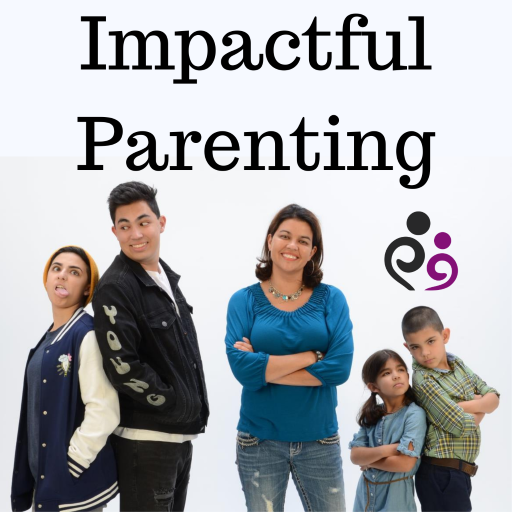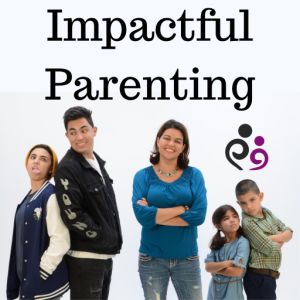

The Impactful Parenting Podcast helps parents turn their chaos into connection with their children. Through meaningful stories, the podcast provides parenting tips for making family life easier! Why? Because school-aged children bring different challenges to parenting that younger kids don’t! The Impactful Parenting Podcast provides help for raising your adolescent child. So if you’re asking yourself questions like: • ”Is this normal?” • ”Why is my teenager doing this?” • ”How do I get my child to stop?” • ”I am so frustrated. What do I do?” • ”Is anyone else experiencing this? I can’t be the only one.” • ”I am worried. What can I do?” Then YOU HAVE FOUND THE RIGHT PLACE! Hi! I am Kristina Campos. I am the founder of the Impactful Parent and my passion is creating better relationships between parents and their children. I am a parenting coach, a teacher who has taught every grade level from Pre-K through high school, and most importantly, I am a mom of 4 kids! (Yep, those are my kiddos in the podcast photo). The teen years don’t need to be difficult. Teenagers CAN have a special bond with their parents! Listen and discover the tools and techniques you need to create connections, build trust, and have a stress-free household. This is only the beginning! Let’s get started, together! -Kristina Campos Founder of The Impactful Parent
The Impactful Parenting Podcast helps parents turn their chaos into connection with their children. Through meaningful stories, the podcast provides parenting tips for making family life easier! Why? Because school-aged children bring different challenges to parenting that younger kids don’t! The Impactful Parenting Podcast provides help for raising your adolescent child. So if you’re asking yourself questions like: • ”Is this normal?” • ”Why is my teenager doing this?” • ”How do I get my child to stop?” • ”I am so frustrated. What do I do?” • ”Is anyone else experiencing this? I can’t be the only one.” • ”I am worried. What can I do?” Then YOU HAVE FOUND THE RIGHT PLACE! Hi! I am Kristina Campos. I am the founder of the Impactful Parent and my passion is creating better relationships between parents and their children. I am a parenting coach, a teacher who has taught every grade level from Pre-K through high school, and most importantly, I am a mom of 4 kids! (Yep, those are my kiddos in the podcast photo). The teen years don’t need to be difficult. Teenagers CAN have a special bond with their parents! Listen and discover the tools and techniques you need to create connections, build trust, and have a stress-free household. This is only the beginning! Let’s get started, together! -Kristina Campos Founder of The Impactful Parent
Episodes

Wednesday Mar 03, 2021
025: Angry Children
Wednesday Mar 03, 2021
Wednesday Mar 03, 2021
Angry Children is a podcast that gives you 3 tips for helping your child. Let's dig deeper to find out where the anger is stemming from and how I can help!
Behavior Management FREE Webinar: https://theimpactfulparent.com/anger-webinar
Anger Management website: https://theimpactfulparent.com/anger
Don’t forget to check out all the FREE resources and tips that The Impactful Parent has to offer! https://theimpactfulparent.com Links to the YouTube channel and social media post are there too! Join The impactful Parent community by signing up for the weekly newsletter. Don’t miss an impactful tip!
Don’t forget to follow The Impactful Parent on social Media! Facebook, Instagram, Linked In, Pinterest, and YouTube.
Transcript:
I am angry. My kids are mad too. Everyone is on each other's nerves. I do not have enough time in my day to do everything I need to do. The laundry is non-stop and never-ending. My kids are tired of my food, and I am annoyed that I must cook. I miss babysitters and grandparents coming over to give me a break. I want to spend fun moments with my kids, but we have exhausted all our "at-home" activities. My high school kids are mad that they were robbed of prom, graduation, and after-school sports. All my kids are angry that they must wear masks all day long, and they do not get to socialize with their friends the way they want. Anger has become a consistent presence in our home.
How do we deal with our children's ongoing and evolving anger? Well, the biggest mistake that most parents make is thinking that ANGER is the problem. They want to eliminate the anger from the house and believe that by doing that- the problem will be solved. It is easy to fall for that wrong belief because anger is what we see on the surface. We can watch our kids, stomp their feet, slam the door, yell, hit, or storm off. It is no wonder that most parents think that anger is the problem and the reason for their child's unacceptable behaviors. But anger is not the problem. Anger is NOT even the primary emotion. Anger is a reactive emotion. Our children get angry BECAUSE they have more underlying feelings happening, and they do not know how to deal with them. Anger can be how children react to being nervous, insecure, and a whole slew of other feelings, but most of the time, anger comes from being sacred or from feeling helpless. Fear drives a fight or flight instinctual reaction in humans, and when we are scared, our reactive behavior can be anger or "fight." When you understand this, it is no wonder that everyone is feeling angry. COVID-19 has made our whole society feel a plethora of emotions, which include frustration, scared, uncertainty, tiredness, worry, nervousness, helplessness… the list goes on. The anger is the reactive feeling to the combination of all these emotions because, just like a volcano filling up with emotional lava- the anger explodes out of the volcano, and it is anger we see on the surface.
So, the next time your child is screaming, slamming doors, or storming away from you- remember to empathize with their emotions. We are frustrated right now with the world and our circumstances, but our children have even less control of their own lives than adults do. Children have even more insecurities, more questions, fewer answers, more fears, and lots of feelings of helplessness. So next time, pause for a moment and put yourself in their shoes. Help them identify the things that they can control and set those apart from the things they cannot change.
Step 1- Help your child identify WHAT OR WHO is making them feel emotional.
Step 2- Help your child identify WHICH emotions they are feeling. (sad, frustrated, helpless)
Step 3- Help your child identify WHAT they do not have any control over and WHERE THEY CAN HAVE SOME CONTROL. For example, children do not have any control over wearing face coverings if they go back to school. But they can control what their mask looks like if they want to decorate it or leave it plain, if they are going to wear a shield instead, or if they're going to wear a store-bought or homemade mask. It is much like the saying, "You don't always have control of what happens to you, but you do have control of how you react to it." Teaching your child to find their controllable choice will give them some power back. This small shift can be the start of a domino effect for implementing emotional change in your child and your home.
If you have a child struggling with anger, please check out my Behavior Management Course: Helping Children with big emotions. Changing behaviors can be stressful, confusing, and exhausting. You do not need to parent alone. This course will walk you through the step by step process you need to teach your child how to control their emotions. Check out the FREE Webinar that will tell you more about the course, and you can decide if it will be the right fit for your family.
No comments yet. Be the first to say something!